Celebrating Marge Birmingham
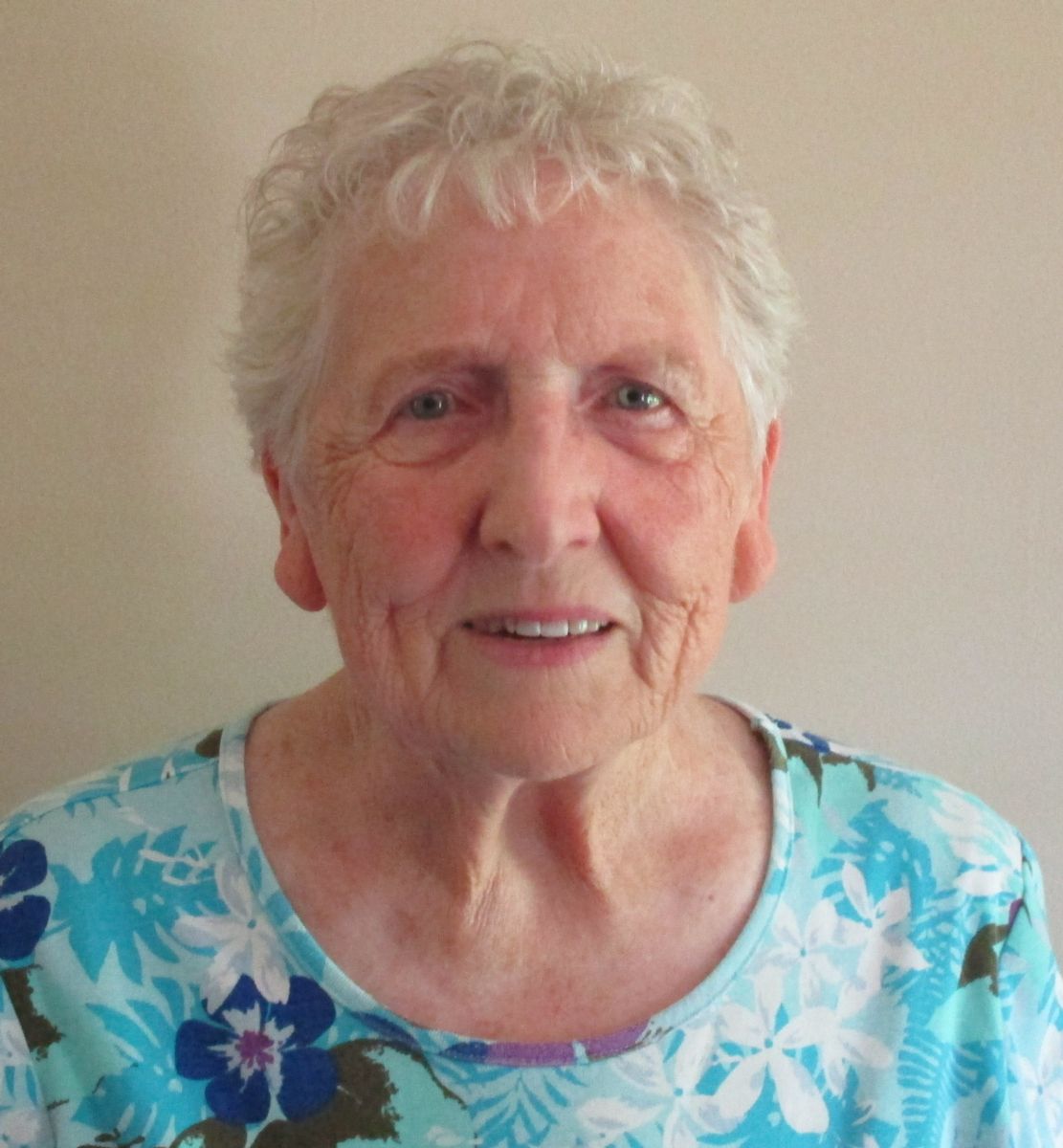 Marge Today - 2018 |
 Marge Surrounded by Her Sisters in Sale, England 1937 |
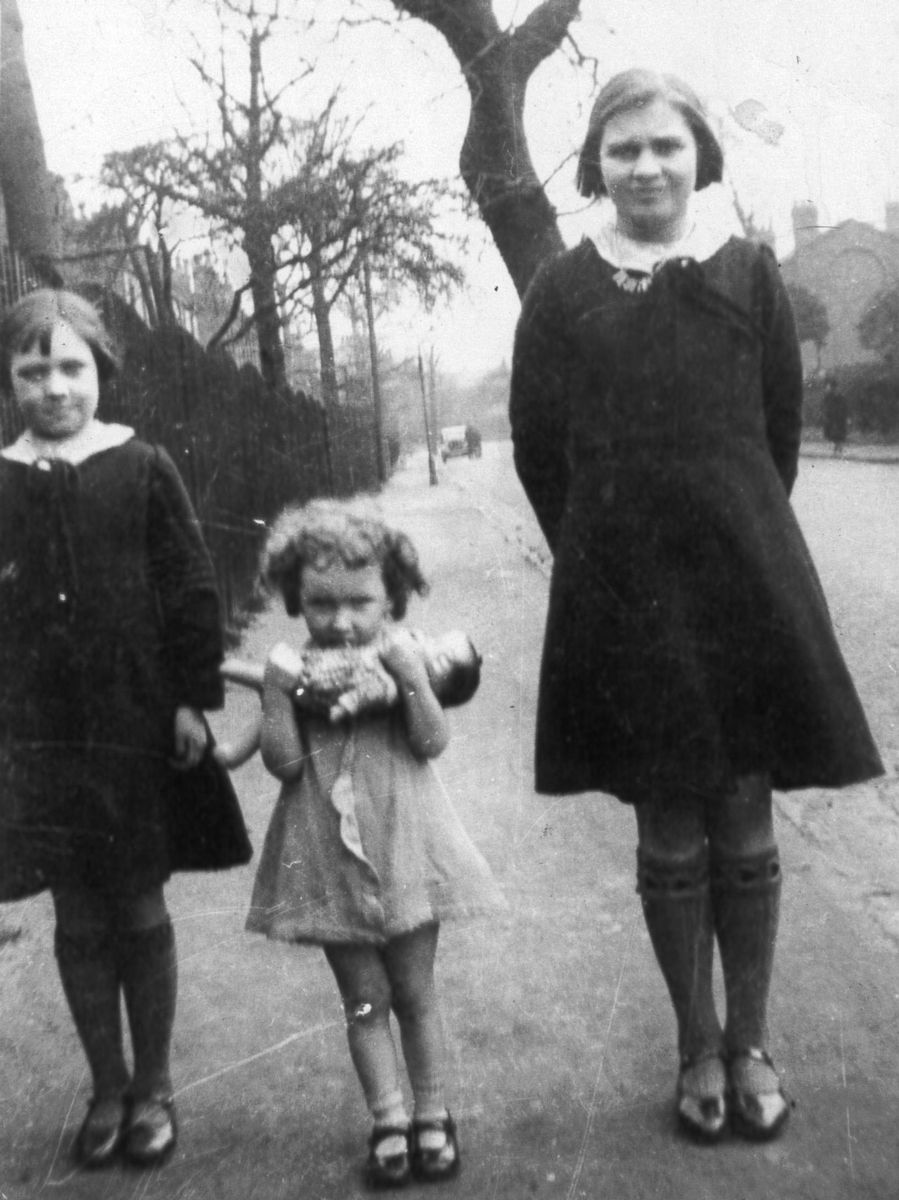 Marge with Her Sisters and Brother in 1940 |
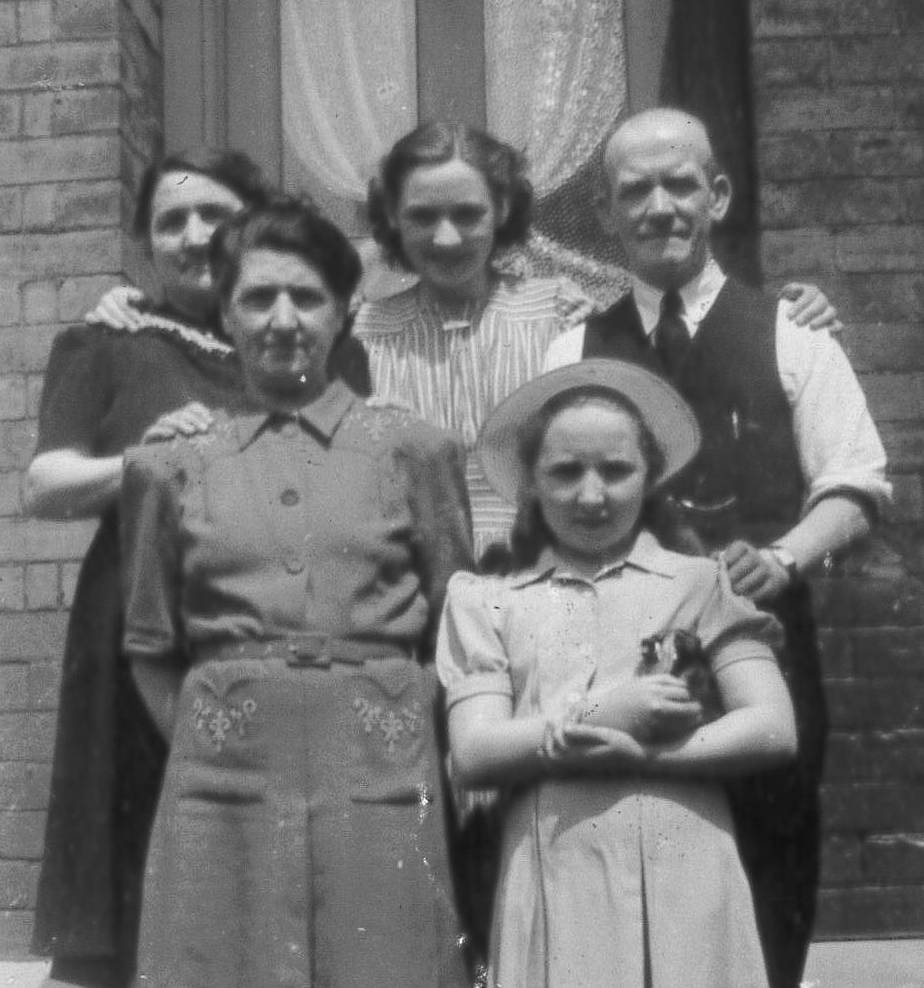 BR: Mother, Sister & FatherFR: Aunt and Marge in 1944 |
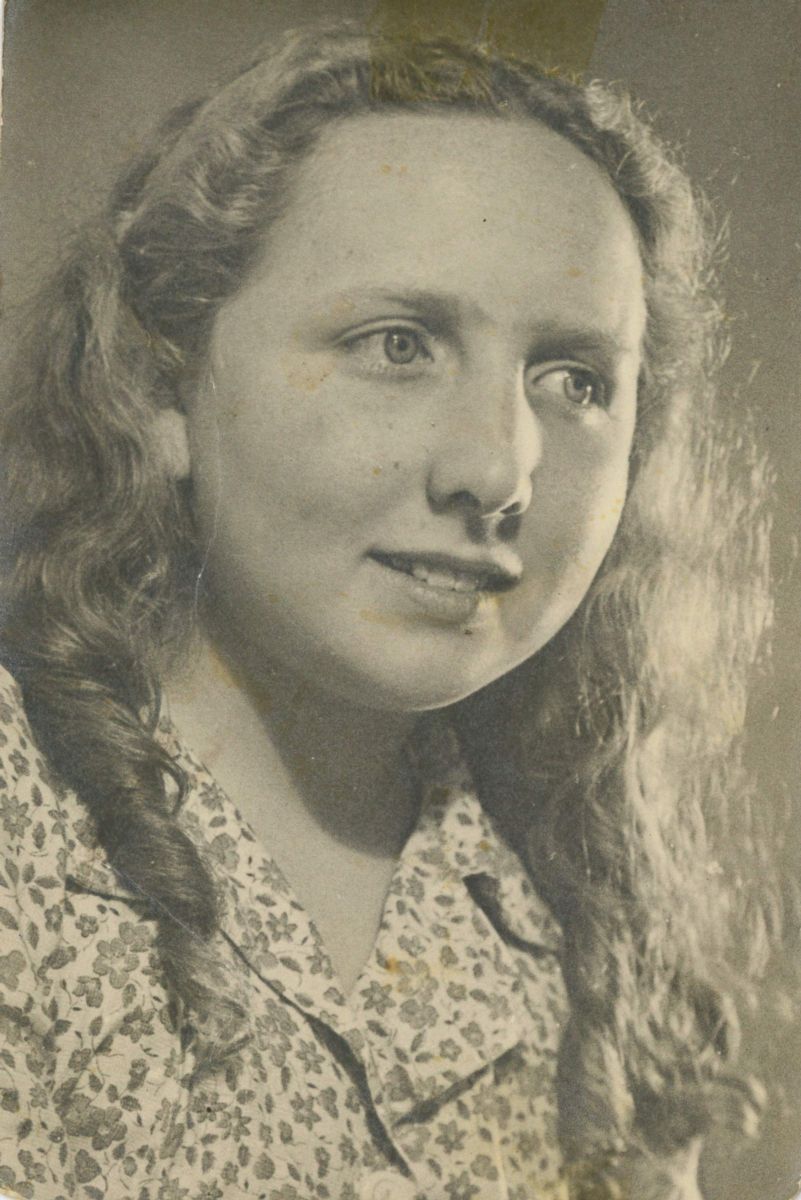 Marjorie Oribin (Birmingham) at age 13, 6th grade, 1947 |
 Marge & Jerry's Wedding Day 1955 |
Celebrating Marge Birmingham
May 2018
Which lady in our church grew up during the time of WWII and would have to practice air raid drills? She had to keep a gas mask with her at all times. She emigrated to the United States in 1952 and sailed over on the Queen Mary. While working on Staten Island, she became known as “The Bra Lady.” I hope you enjoy reading her account of a driving experience she and her sister had while visiting England — as I did! This month we celebrate Marge Birmingham. Kae Mattingly
My Story
In 1921, my father, mother, and brother emigrated to the United States from England. They settled on Staten Island and my dad worked for Proctor and Gamble. In 1930, They were transferred to California and in 1933 my mother decided she missed her family. They went back to England and settled in the small town of Sale, about five miles south of Manchester. Dad worked for Thomas Hedley and Co., a subsidiary of Proctor and Gamble. In 1934, I was born.
In 1939, Hitler decided he wanted to rule the world. The war began in September when I started kindergarten. The classes were small. The teacher I had, Miss Moore, was a gem. I still remember her as my favorite. Each day started with a 15 minute service in the Main Hall. One hymn, one prayer, and a few words from the Principal. The Government issued gas masks to everyone and we practiced using them in class. Every two weeks the police came and checked them for damages. The girls did well, but the boys thought they were there to kick around and the police had to keep fixing them. We had air raid drills and marched across the school yard into the field and down into the shelters. They were constructed of galvanized steel covered with soil and grass (this made them unnoticeable from the air). The teachers played useful games like spelling until the all clear was sounded and we marched back to the class room and continued working. When I was eleven, I went to middle school, and at 13, I transferred to a commercial school where they taught office skills and shorthand, typing, etc.
Our homes were very dark. All the windows were shrouded in black fabric and everything had to be closed by 5 or 6 o’clock. If any light showed, the warden warned us and we had to close them or get fined. Our food supply was very small and I would ride my bike to the store and bring food home. It didn’t weigh very much. Every day my mom would go out and see what she could get — not much, but my dad had a garden of vegetables which he tended and mom turned it into whatever she could. We did not ask what it was, we just ate it. We rode our bikes everywhere to get around. To make a phone call you had to go to the “red phone booth,” tell the operator who you wished to speak to and then she would make the call and call you back and it took time, but we had no choice. We had two phones on our road, one for the gas station, and one for a chauffeur. He also had a car for his job. My parents did everything to protect us and the war was just something we heard about from the radio and the newsreels at the movies. We attended Sale Congregational Church, and were in the Sunday School and Youth Group and everything they did was to keep us occupied. When we were told the war was winding down all the kids in our neighborhood went around collecting wood from whoever had stuff to burn in a bonfire to be held in the street when VE day arrived. Flags flew from every home, and everyone participated, parents, friends, and anyone who wanted to party.
I emigrated to America in 1952, with my sister. We came over on the Queen Mary and were overwhelmed by the opulence of the ship and the bounty of food laid out at each meal. We looked, but could not eat, it was too much. We met people our own age and it was a great trip. On day five, we were encouraged to go up on deck and watch the high towers appear out of the clouds and also The Statue of Liberty. I hate to admit it, but I did not know anything about the statue. American history was not taught in our school. My parents always told us the streets of New York were paved in gold. What they really meant was, “This is the land of opportunity.”
We were met by relatives we had never met, and it was a little strange. I should say very strange, but we soon settled down when we arrived on Staten Island. A feast was set out for us, and again we did not eat. But it didn’t take long for us to enjoy Italian food — English food had been very bland for a long time.
A close relative decided it was time for me to go job hunting. I was told how to get to Broadway and off I went. The first offer I received was very low, as per my relative. He told me to go again the next day. Being young and not too outspoken, I went again. This time I went to U.S. Steel. The offer was much better. My boss told me I had to get working papers. I had been working in Manchester for two years, and thought it strange, but he explained that being underage, 17, I would need them. A social security card and a medical would be needed also. A lot to accomplish in a new country.
The excitement of being here soon tarnished. I missed my boyfriend and my regular friends, but knew there was nothing I could do to change things at that time. When my parents arrived I told my mom I thought I wanted to go home, but she told me I had to stay one year and then decide. Of course that year changed into a lifetime.
Jerry and I met briefly in 1952 shortly after I arrived in America. We shared niceties and then went our separate ways. Fast forward, to 1953. My friend invited me to go out with them to a small nightclub on Staten Island before her boyfriend left again (he was in the Navy). Jerry and I met up again, this time was full of conversation. He was leaving for England the following week with the Navy. He wanted to know if we really had a lot of fog over there. I assured him we did not, and then his ship was anchored in the harbor at Portsmouth for three days until the fog cleared. How was I to know they would have fog in June (Hmm, maybe I did!). It was very soon after Elizabeth was crowned so the place was jumping and he had a ball. The American soldiers were treated very well in England. He returned in August and we then became a couple. We married in December 1954, right after Christmas. The ship left again for the Mediterranean for three months.
When he returned I had an apartment set up and we settled in. It was so small, but cozy. The years passed and we had five daughters, five granddaughters, and five great-grandchildren with one on the way. We had two moves and then we moved into a big house, or so we thought, until our daughter came home with twin girls. I went to work at Macy’s on Staten Island when it opened and stayed in the lingerie department for 27 years. I became known as “The Bra Lady.”
I sang in the choir at Oak Wood Heights Community Church, a nondenominational church, and became involved in every aspect of church life. I spent two years on the Search Committee when we were looking for a new minister. We did eventually find a very nice minister from Ashville, North Carolina.
In 1978, after my parents had passed away and our big families were raised, my sister and I decided to make a trip back to England to visit relatives, friends and old haunts. Our house was still standing, but we did not get a chance to go in. Church did not change and we met many friends from the Youth Group of which we were a part of. The fun part of the trip started when we landed, and my sister said she could drive a shift car, not realizing everything was on the other side. Well, she steered and I shifted. It was, to say the least, an enlivening moment. The porter who helped us load our things in the car could not stop laughing as we went round and round the parking area trying to get out of the airport. We arrived at the hotel eventually and called the office where we rented the car and they came and picked it up, and gave us an automatic car. We only managed to knock one piece of chrome off the second car and dent one of the tires. We went from Scotland to Manchester, then to Birmingham and finally to London. At the end we knew, at least, how to drive on the wrong side of the road! The trip also gave us a chance to spend time together and talk about our families. We met people we remembered and many who were vague to us, but we enjoyed everything about the trip.
Jerry became ill in 2004, when they found he needed a new aortic valve. The surgery went well. Then in 2005, he came down with cancer and the rest is history.
In 2013 I moved to Kernersville and became involved in the community. I joined the New Comers Club which, by the way is for anyone not only newcomers. I fill in at the Senior Center when they need an extra and I help with the mailings from the center. I could do more, but I find I enjoy being home.
On October 19, 2014, I joined First Presbyterian Church in Kernersville, North Carolina. I immediately joined the choir. I am a member of the Worship and Music Committee. I enjoy participating in the egg ministry.
Marge Birmingham
MARGE IS MOST PROUD OF:
MARGE’S WORDS OF WISDOM:
|
|
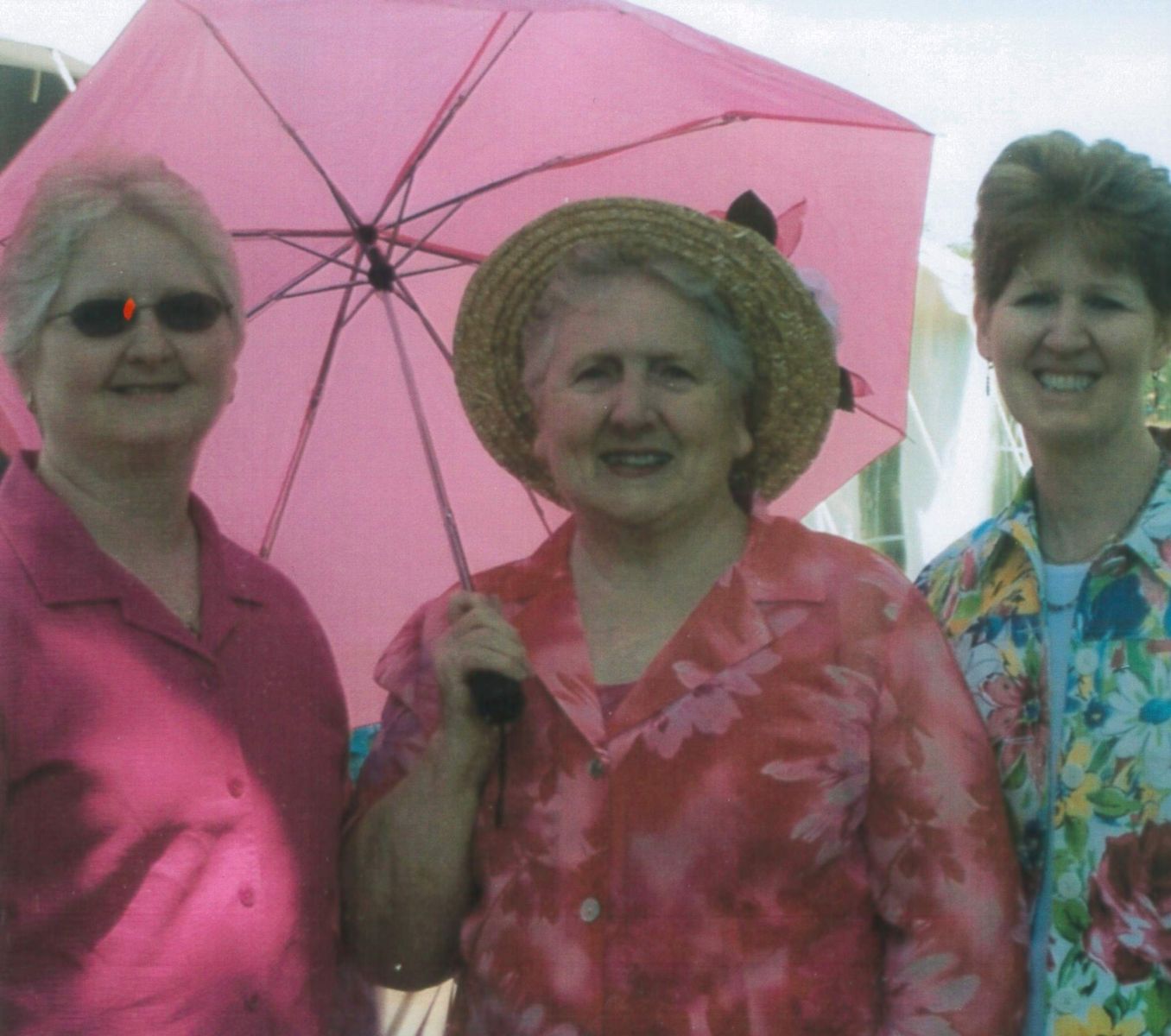 Marge at a Garden Party in 1999 |
 Marge with Her Five Daughters in 2014 |
